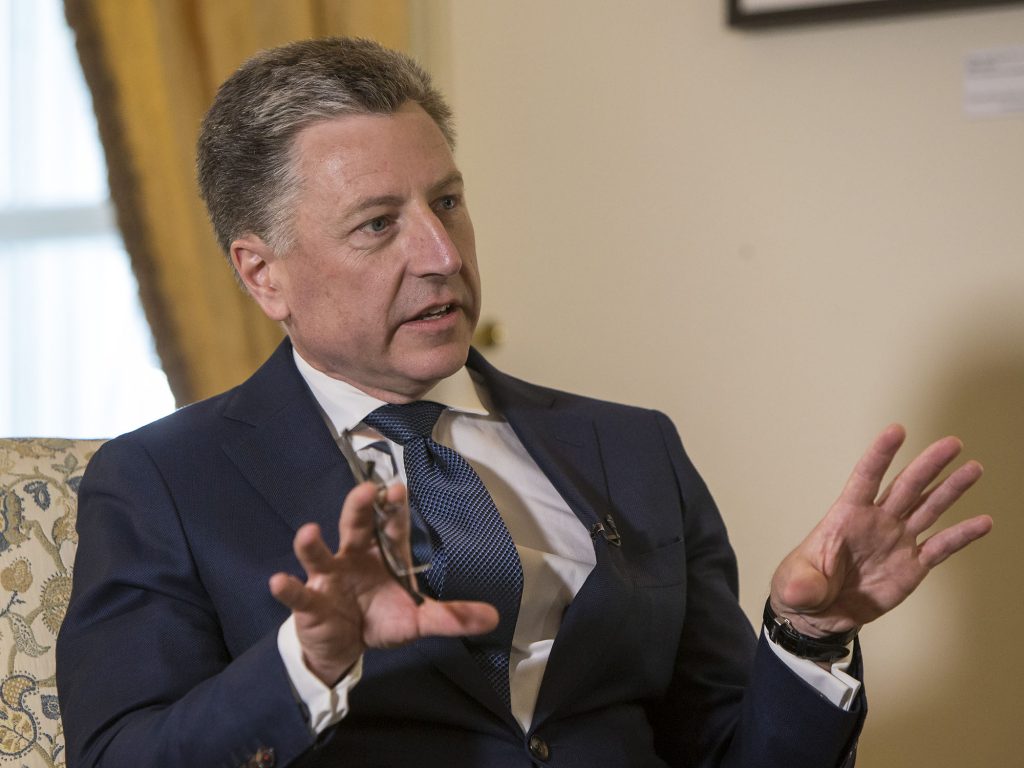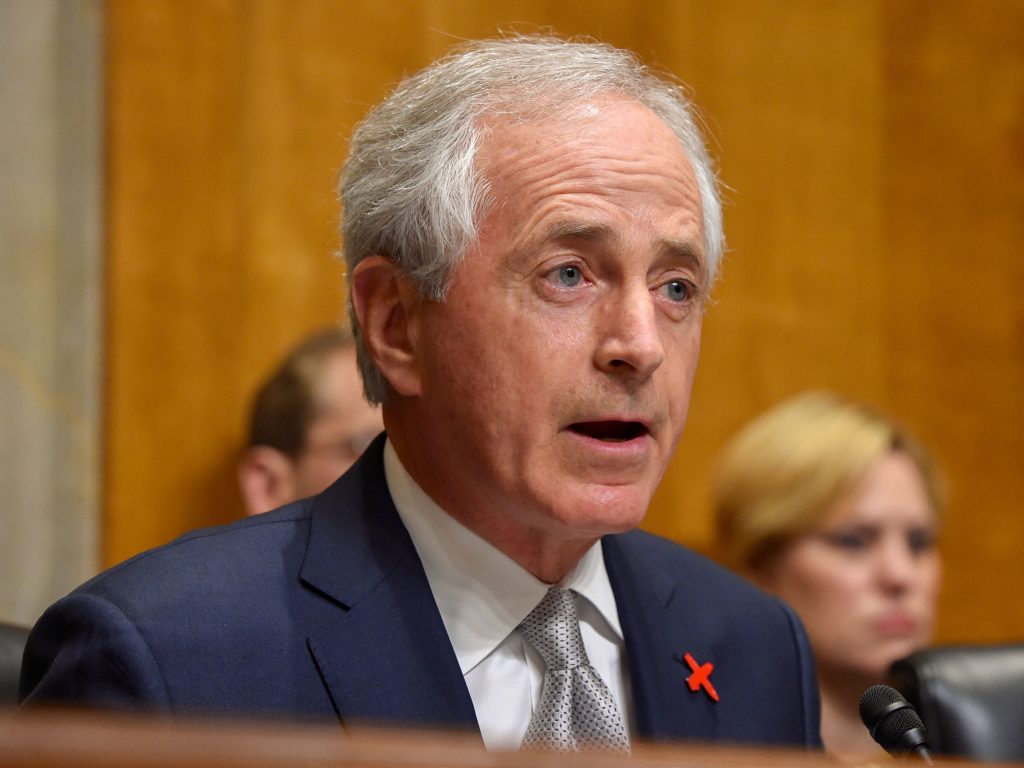In “The New Russia Sanctions Law–What It Does and How to Make It Work,” authors Ambassador Daniel Fried, distinguished fellow at the Atlantic Council and former coordinator for sanctions policy at the US State Department, and Brian O’Toole, a nonresident senior fellow at the Atlantic Council, explain that Congress primarily adopted the law to block a unilateral lifting of sanctions, which was under consideration in the early days of the Trump administration. Fried and O’Toole add that, by passing the act, Congress was able to demonstrate its determination to resist Russian aggression in Ukraine and elsewhere and to penalize Russia for hacking the 2016 US presidential election. This paper includes an analysis of the law’s key sanctions provisions, suggestions to the administration about how to implement them, and key areas for the business community to watch, from two former US government officials who helped design and run US sanctions on Russia until earlier this year.
Context and summary
The Countering America’s Adversaries Through Sanctions Act of 2017 (HR 3364), which President Trump signed on August 2, 2017, was originally introduced as an Iran sanctions bill but became an amalgamation of several proposed sanctions bills involving Russia, Iran, and North Korea.1For the text of the sanctions act under discussion in this issue brief, please see: HR 3364, “Countering America’s Adversaries Through Sanctions Act,” 115th Congress (2017-2018), https://www.congress.gov/bill/115th-congress/house-bill/3364. It likely captured attention and was passed swiftly by the House and Senate—and with huge margins—because of its Russian sanctions provisions. The act was primarily adopted to block an unearned, unilateral lifting of sanctions, which was under consideration in the early days of the Trump administration. By passing the act, Congress was able to demonstrate its determination to resist Russian aggression in Ukraine and elsewhere and to penalize Russia for hacking the 2016 US presidential election.
Earlier sanctions imposed on Russia by the United States and European Union (EU) and the threat of increased sanctions were critical factors, alongside the fall in oil prices and Ukraine’s military efforts, in limiting Russia’s aggression against Ukraine and freezing the line of contact, which helped set the table for the Minsk Accords. The economic impact of these sanctions on Russia was significant; many have observed that while the steep decline in oil and gas prices had the largest contributing effect in Russia’s economic recession, sanctions accelerated the economic downturn and have played a role in hampering Russia’s ability to climb out of it. The sanctions, which demonstrated US-EU unity while pointedly isolating Russia, also undermined Russia’s self-image as a rising world power and highlighted President Putin’s inability to shield some of his closest associates from international sanction. In passing this new act, Congress was able to reasonably conclude that sanctions were a useful tool in bringing about a settlement in Ukraine, which was their original purpose, and could be used to put in place a strong framework to deter additional Russian aggression in Europe.
Beyond the headlines, HR 3364 is a substantive and complex sanctions law, with workable sanctions provisions but also several potential traps. On Ukraine, HR 3364 formally writes into law existing sanctions on Russia and tightens several measures; it further imposes new sanctions mandates in response to Russian cyber hacking, corruption, human rights abuses, and military adventurism in Syria. Some of its provisions could help the administration advance a strong Russia policy; others—reflecting the Senate’s haste to write the bill—contain pitfalls that will need to be managed by the administration or amended by Congress in the future.
This paper includes an analysis of the law’s key sanctions provisions, suggestions to the administration about how to implement them, and key areas for the business community to watch, from two former officials who (full disclosure) helped design and run US sanctions on Russia until earlier this year. Among other things, we urge the administration to:
- Use the leverage of the existing Ukraine-related sanctions—now written into law—to push, along with our allies, for a diplomatic settlement for the Donbas that restores Ukraine’s sovereignty, making clear that the US government will, as it has committed, lift Donbas-related sanctions (not those related to Crimea) once a settlement is reached and implemented;
- Use the slightly expanded cyber authority to pursue sanctions designations for malicious cyber activity by Russia, including activity aimed at undermining democratic institutions or governments;
- Exercise caution in implementing some problematic authorities (and mandates), e.g., against governments purchasing Russian defense equipment and against investments or upkeep of energy pipelines, including gas pipelines;
- Maintain flexibility in sanctions implementation for the US Treasury Department’s Office of Foreign Assets Control (OFAC), especially with respect to licensing, a critical tool in dealing with the unanticipated consequences of strong sanctions programs, and to delisting individuals and entities from sanctions lists; and
- As the law directs, continue to work closely with Europe to maintain, enforce, and if needed intensify sanctions related to Ukraine. Also, explore with Europe potential new sanctions, especially in response to Russia’s use of cyber tools to interfere with elections and otherwise disrupt democratic institutions.
Substantive provisions: analysis and implications
Ukraine-related sanctions
Provisions to prevent unilateral lifting of current Ukraine-related sanctions
Section 216 on the Sanctions Act of 2017 (HR 3364) draws from previous legislation (which authorized congressional review of the Joint Comprehensive Plan of Action on Iran) to provide for both congressional review and the potential rejection of sanctions lifting. Its language suggests that Congress would support easing of sanctions in response to fulfillment or implementation of the Minsk Accords (which outline a settlement in the Donbas that removes Russian forces and advisors and restores Ukrainian sovereignty—including over its Eastern border—in return for local autonomy, local elections, and amnesty). The Minsk Accords are currently the agreed US and European benchmark for sanctions easing. This provision reflects congressional concerns that the administration might lift sanctions as a unilateral gesture to Russia.
As written, however, Section 216 goes well beyond congressional review of significant sanctions lifting. Under its terms, Congress must review, and can disapprove of, any delisting of individuals or entities by OFAC, any waiver of the sanctions measures passed by Congress, or any licensing actions that “significantly alter United States Foreign Policy with regard to Russia.” Critically, and happily, a last-minute addition to Section 216 exempts from review routine licenses that OFAC uses to limit the spillover effects of sanctions on the United States and its partners and to fix unanticipated effects of sanctions.
Section 222 writes into law six executive orders (EOs) from the Obama administration—four of which established the Ukraine-related Russia sanctions program in mid-2014 and two of which established the cyber sanctions program used against Russian targets in December 2016. Additionally, Section 222 requires that, in order to waive any new sanctions, the administration must certify that Russia is “taking steps” to implement the Minsk Accords “and any successor agreements that are agreed to by Ukraine.” Section 222 also subjects termination of sanctions to the same congressional review process laid out in Section 216.

Provisions to increase Ukraine-related sanctions
Section 223 tightens OFAC’s Directives 1 and 2 (under EO 13662 of July 16, 2014, which imposed broad “sectoral” economic sanctions on Russia) by decreasing the allowable term of extensions of debt and credit to Russian banks and energy companies. It also extends worldwide the restrictions of EO 13662’s Directive 4 on Russian firms involved in “special” oil production technology (for shale, deep water, and Arctic offshore projects), although a late amendment requires at least 33 percent interest in such a project. Section 233 additionally authorizes Treasury to add the railway or metals and mining sectors to the list of Russian economic sectors subject to discretionary sanctions.
Implications and recommendations:
By locking in current Ukraine-related sanctions against Russia and requiring congressional review of sanctions easing, the law blocks the administration from acting on its apparent earlier temptation to lift them unilaterally, as an unearned gift (a “good will” or “trade-off” gesture) to Russia. This review provision is probably the most important provision of the law, and, while understandable in its motivations, it puts Congress in the unusual, and potentially awkward, position of managing this element of US foreign policy toward Russia. The escalatory provisions are relatively modest, and generally in line with current US-EU joint sanctions, assuming the administration uses the flexibility built into the more problematic measures (discussed later) to maintain solidarity with European and Group of Seven allies.
By giving itself a role in sanctions implementation—traditionally the purview of the executive branch—the congressional leadership must make clear that Congress will support lifting Ukraine-related sanctions, except those with respect to Crimea, if Russia fulfills its commitments under the Minsk Accords or a successor agreement, as the US has committed. The Ukraine-related sanctions, like sanctions generally, are intended to change behavior. If Congress were to move the goalposts, US leverage using sanctions to advance a Ukraine settlement (the original purpose of the sanctions) would be weakened or lost, and US objectives thus undermined. For example, Russia would have less incentive to de-escalate attacks on the line of contact or refrain from other destabilizing acts or escalation against Ukraine.
Section 222’s provision for waiving sanctions if Russia “is taking steps” to implement the Minsk agreements provides flexibility for the administration to provide some easing of sanctions in return for partial progress on Minsk. We would counsel, however, against a “small-for-small” approach, as progress on the ground might be too easily reversible, while sanctions, once lifted, might not be. Nevertheless, we applaud Congress for building in this flexibility should it become a viable option for restoring Ukrainian sovereignty, stability, and territorial integrity.
Despite the carve-out for routine licensing action, the business community should be ready to make its case for such licenses to avoid them becoming political footballs. It should emphasize that they are necessary to avoid unintended impacts or consequences that unfairly put US firms at a disadvantage, taking care that its arguments are credible and accurate. Congressional leadership appeared willing to listen to reasonable analysis from the business community, judging from changes in the final bill.
Despite potential drawbacks, congressional oversight of sanctions has one significant advantage: the Russian government can no longer count on the United States to abandon sanctions unilaterally, which places Europe and the United States—including Ambassador Kurt Volker, the new US Special Representative for Ukraine Negotiations—in a stronger position to push for a Minsk-based diplomatic solution. The law’s confirmation of Minsk (and any successor agreement Ukraine agrees to) as a criterion for sanctions waiver, maintains the US government’s ability to respond to diplomatic progress. The law thus sets up the United States to make a push alongside Europe to settle at least the Donbas part of the Ukraine conflict.
New sanctions authorities
The law includes new, mandatory authorities for cyber-, corruption-, and human rights-related sanctions. These new mandates generally duplicate existing authorities (e.g., cyber-sanctions EOs from the Obama administration and the Global Magnitsky Act, which provide sanctions authorities but do not mandate their use), and thus convey both congressional determination to impose sanctions in these areas and frustration with the Obama and Trump administrations’ responses to cyber hacking during the 2016 elections.
Cyber security
Section 224 mandates sanctions against those helping Russia to undermine cyber security against any democratic institution or government (including, but not limited to, US institutions). The administration will have some latitude to define “undermining cybersecurity against any person, including a democratic institution,” which appears broader than the current Obama-era authorities.
Section 224 modestly expands current cyber-related authorities, which have only been used sparingly, and makes it potentially a more flexible tool to deter cyber hacking by Russia. A subsection [224(a)(1)(A)] requires the sanctioned person to be acting “on behalf of” the Russian government, an additional designation hurdle. If it intends to act on these authorities, the administration will need to prioritize information collection and use authorities to allow for clearer identification of malicious cyber actors and their sponsors, a more difficult issue in cyber-related sanctions than in most other sanctions authorities.
Such expanded authority may allow for more effective targeting, potentially to include disinformation-related campaigns designed to interfere with election processes (e.g., officially sponsored bots and trolls). The administration could also use a broader authority to work with willing allied and friendly governments threatened by Russian cyber aggression, e.g., Estonia and Ukraine, and consult with the EU about common approaches to Russian malign cyber actions, including sanctions.
As malicious cyber activity frequently targets the business community, companies should be quick to share information with their governments (or even fellow victims) that can help authorities to identify the perpetrators and pursue action against them, as well as bolster defense and deterrence efforts.
Corruption and human rights abuses
Sections 227 and 228 mandate sanctions against Russian officials (and family members) involved in significant corruption and those involved in serious human rights abuses in areas forcibly occupied by Russia, including occupied areas of Ukraine and Russian-sponsored breakaway territories of Georgia. These authorities are similar to, but slightly broader than, those available under the Global Magnitsky Act, which is discretionary. In addition, Section 233 mandates sanctions for those knowingly facilitating corrupt privatization deals with Russia, a standard that likely would also meet the law enforcement threshold under most anti-bribery laws, such as the United States’ Foreign Corrupt Practices Act or the UK’s Bribery Act, suggesting that the business community should not be unduly concerned about the provision, given the “knowingly” and “corrupt” thresholds.
Congress appears to have intended this provision to be used, given its mandatory nature and broader authorities. Implementation will be difficult, however, given the challenge of assembling a fact base sufficient to meet OFAC’s properly rigorous standards. In practice, this administration, or a successor, could pursue these authorities in conjunction with even more flexible and easily-substantiated authorities, such as the Ukraine-related EO 13661, which authorizes sanctions against any Russian official and against certain associates of senior officials; or EO 13662, which authorizes sectoral sanctions. However, we caution against using Ukraine-related sanctions authorities to make non-Ukraine-related Russia sanctions designations to avoid muddying disparate policy objectives.
Implementing these provisions will require intense effort, similar to the labor-intensive process of implementing the original Magnitsky Act (not Global Magnitsky, which has yet to be implemented). Designations, similar to those in the Magnitsky Act, therefore are likely to be few in number, though the political impact could be significant.
Potentially problematic authorities
The act includes several provisions so broadly scoped that careless implementation could damage American interests, including by forcing sanctions on US allies and partners or otherwise going beyond current Ukraine-related authorities in ways that damage US-EU solidarity on sanctions. This solidarity has been key to increasing and maintaining pressure on Russia, which has frustrated Moscow’s efforts to drive wedges between allies and otherwise deflect pressure directed at the Kremlin.
Dealings with the defense or intelligence sectors
Section 231 mandates sanctions on persons engaging in significant transactions with the Russian defense or intelligence sectors.2“Company Organizational Structure,” Rostec, accessed August 11, 2017, http://rostec.ru/en/about/structure. It may be intended to force reductions in Russian arms exports (using the model of Iran sanctions for significant reductions of Iranian oil exports). But it also may have unintended and potentially damaging consequences. For example, the Russian defense technology firm Rostec is already subject to sanctions (financial restrictions) for being part of the defense sector under Directive 3 of EO 13662, along with up to 700 entities connected to Rostec that stretch across both military and civilian sectors. This measure could, if broadly interpreted, impair legitimate, civilian trade due to the breadth of business Rostec engages in, which would go well beyond the current US-EU construct of sanctions. Additionally, because Russia is the world’s second largest arms exporter, this provision could be construed to apply to many countries, including US friends and partners like India, Vietnam, and Iraq—and even arms market competitors, such as China3.“TIV of arms exports from Russia, 2000-2016,” Stockholm International Peace Research Institute, last modified August 11, 2017, available for download at http://armstrade.sipri.org/armstrade/page/values.php. In addition to generating significant problems with friends and partners, this provision could open the United States to charges that it was using sanctions to boost US arms sales.
With these potentially damaging consequences, the administration will need to make use of the provision requiring guidance within sixty days of the act’s passage to lay out a clear and implementable scope of sanctions that targets Moscow’s arms exports and intelligence structures without harming allies and partners.
There may be outcry from some corners at any definition that narrows the aperture, but such narrowing is critical to preserving the integrity of the broader international sanctions regime on Russia and avoiding a pointless fight with allies and friends.
The remaining 120 days between the time the guidance is issued and when the sanctions become active will provide opportunities for the business community as well as allied and friendly governments to assess the impact, and potentially to approach the administration to adjust the definition to allow for the sustainable application of sanctions.
The administration may also seek to use the waiver and “significantly reducing” provision (modeled on Iran sanctions authorities) to mitigate the impact of these sanctions targeting allies and partners that cannot easily cease Russian arms dealings without serious risk to operational readiness.
President Trump, notably, cited in one of his signing statements the need to use Section 231’s flexibility to “delay sanctions on the intelligence and defense sectors, because those sanctions could negatively affect American companies and those of our allies.”4Statement by President Donald J. Trump on Signing the “Countering America’s Adversaries Through Sanctions Act,” White House, August 2, 2017, https://www.whitehouse.gov/the-press-office/2017/08/02/statement-president-donald-j-trump-signing-countering-americas.
Energy pipelines
Section 232 provides authority for discretionary sanctions against those supporting or investing even nominal amounts to develop Russia’s oil and gas pipeline networks, including the provision of technical services and support. The EU, Germany in particular, objected to this provision on the (accurate) grounds that the United States and Europe had agreed early on not to target current or conventional Russian oil production and delivery or the Russian gas sector, despite long-standing US opposition to Germany’s Nord Stream 2 gas pipeline through the Baltic Sea. Some of the public objection raised to this provision in Germany may have reflected political posturing for the then-ongoing German electoral campaign, and, due to its permissive nature, Congress may also have intended this to be largely symbolic. While the restrictions seem limited to pipeline construction, energy companies and some experts have noted that the language, although discretionary, could chill even routine maintenance in otherwise non-sanctioned pipeline projects.
The administration should show caution in implementing this discretionary sanction, which happily contains the explicit instruction that it be coordinated with allies, a late addition that should largely assuage European and US parties, including businesses, critical of the provision. While not defined, this would seem to discourage unilateral US sanctions action in most cases. Although the administration failed to address this provision in the presidential signing statements, it could announce its intentions to use Section 232 in only limited ways and only in coordination with allies, when issuing and implementing EO or in delegating presidential authorities under the act.

Special crude oil projects and foreign financial institutions
Sections 225 and 226, respectively, mandate sanctions on foreign persons making significant investments in special Russian crude oil projects covered by Directive 4 of EO 13662,5Projects with the potential to produce oil in shale, Arctic offshore, or deep water locations. and on foreign financial institutions conducting significant financial transactions with any person placed on the Specially Designated Nationals (SDN) List (those who are subject to full OFAC blocking sanctions) pursuant to existing Ukraine-related sanctions authorities. As with Section 231, these measures, if implemented, could have far-reaching effects on US allies and partners, risking US-EU unity on sanctions, and on otherwise legitimate trade with Russia.
The types of special oil projects addressed in Section 225 are already under EU restrictions, but the EU allows exemptions for pre-existing contracts. Those companies exempted by the European Union could then end up exposed to sanctions under this provision. To date, this has not been a major problem in practice, and Section 225’s restriction seems designed to deter non-US companies from aggressively “backfilling” on such projects; however, it would need to be applied carefully, only in egregious cases.
More critically, Section 226’s provisions, if implemented aggressively, could have a major escalatory impact because the sanctions would likely end up forcing the administration to cut US banking relations with all major Russian financial institutions, damaging otherwise legitimate trade with Russia and opening a significant gap between the US and EU sanctions that could also potentially expose EU financial institutions to sanctions. Escalation against the Russian financial sector should be undertaken in response to additional bad Russian actions, coordinated with Europe, and targeted to achieve specific policy outcomes and results, not as a possibly unintended result of legislation copied and pasted from previous Iran-related sanctions laws.
Both Sections 225 and 226 contain clauses that the sanctions are to be imposed unless “the President determines it is not in the national interest of the United States to do so.” We urge the administration to make use of that determination and, in most cases, to avoid imposing sanctions under these sections.
Sanctions evaders
Section 228 targets evaders of existing sanctions, along with any immediate family members of someone so designated. Although the administration has the authority to target sanctions evaders under current Ukraine-related EOs, this section is significantly broader in that late edits to the original draft widened the scope to include any person knowingly facilitating significant transactions for any person subject to sanctions with respect to Russia. This sets up a construct that potentially could be used broadly to cut off business with Russia, rather than just to address sanctions evaders, as the section’s title states.
The Trump administration has followed the Obama administration’s practice of regular issuance of “sanctions maintenance” lists, which have included designations of evaders. We presume that this provision was primarily intended to convey Congress’s encouragement for the administration to continue going after such targets, particularly those moving assets for senior Russian officials and cronies.
If we are correct on legislative intent, then we would recommend to Congress that it modify this provision in a future amendment to clarify the intended scope, and not inadvertently impede broader trade.
Either way, we believe it is critical that the administration use this authority only for sanctions evasion cases, and make that stance clear in a public statement upon issuing an implementing EO or at delegation of presidential authorities.
Reports and escalatory options
Congressionally mandated reports are usually derided within the executive branch as a waste of time and resources to produce products that few read. While sharing some of that skepticism, two of the mandatory reports in the new law point to potential future sanctions should Russia undertake additional aggressive actions. A third requires information on efforts likely underway as a matter of routine sanctions enforcement.
Report on Russian oligarchs and parastatal entities
Section 241 requires a report on oligarchs and other political figures close to the Putin regime, including what is known of their (and their families’) business interests; and on Russian parastatal entities. The report must also include an assessment of imposing debt and equity restrictions (presumably similar to those already imposed on major Russian state banks) on parastatal companies, which in practice are likely to be linked to Russian oligarchs.
Report on expanding sanctions to sovereign debt
Section 242 requires a report on the impact of expanding sanctions to include Russian sovereign debt and derivative financial products under Directive 1. Such a sanctions step could be a viable option should the United States, in consultation with Europe, wish to intensify sanctions on Russia, for example in response to Russian escalation of violence in Ukraine or lack of cooperation in seeking a diplomatic solution in Ukraine along the lines of the Minsk Accords.
Report on illicit finance
Section 243 requires a report detailing US government efforts to analyze and combat illicit Russian financial flows and other steps to enforce sanctions. These steps appear to have been underway for some time, judging by the periodic OFAC designations of sanctions evaders and other targets under the sanctions maintenance process.
Operational considerations
Given the intense interest in the administration’s Russia policy, this broad and complex sanctions legislation was drafted, debated, and passed with little time to consider all the implications and potential problems. We understand the concern among members regarding the Trump administration’s intentions toward Russia, and Congress’s desire to review, and possibly block, any “grand bargain” with Russia. Nevertheless, Congress should not inadvertently undermine the sanctions tool more broadly or cripple the ability of the professionals at the Treasury and State Departments who have designed, developed, and continue to implement sanctions targeting Russia (including a well-timed, strong Russia “sanctions maintenance” package in June).6“Russia/Ukraine-related Designations and Identifications,” US Department of the Treasury, Office of Foreign Assets Control, June 20, 2017, https://www.treasury.gov/resource-center/sanctions/OFAC-Enforcement/Pages/20170620.aspx. We therefore recommend that the administration, working with Congress:
Maintain OFAC’s delisting and licensing flexibility
As noted above, Section 216 mandates that any delisting of an individual or entity from OFAC’s SDN list be subject to congressional review and potential disapproval. We can understand Congress’s desire to review and approve a Minsk or Minsk-successor deal, or block efforts to give Russia unilateral relief through unmerited delistings; however, it is critical, both for legal and policy reasons, that OFAC retain unfettered authority to delist an individual or entity if it lacks the evidence to sustain a listing.
If Congress insists on keeping someone on the SDN list even if OFAC lacks sufficient evidence to do so, it is likely that a court would strike down the listing if a challenge were brought. Such an action would undermine OFAC listings across all programs (e.g., counter terrorism and Iran) and make it more difficult to sustain listings in the face of what would likely be increasing legal challenges.
More broadly, the administration needs the flexibility to remove someone from the SDN list based on changed behavior. Without this authority, one of the primary uses of sanctions leverage would be weakened.
To mitigate the problem, Congress could simply add an amendment to future legislation, such as the National Defense Authorization Act, to exempt routine, evidence-based delistings from review. Doing so would maintain the strength of sanctions as a national security tool.
Congress should not inadvertently undermine the sanctions tool more broadly or cripple the ability of the professionals at the Treasury and State Departments who have designed, developed, and continue to implement sanctions targeting Russia.
OFAC’s authority to issue specific or general licenses as an integral, routine part of any sanctions program serves (among other things) as a “safety net” that allows for fast and robust sanctions targeting and implementation. Authority to license allows the US government to pursue larger, more significant targets and deal swiftly with unforeseen consequences. We urge Congress to give the professionals at OFAC and the State Department the latitude to interpret what licenses alter US foreign policy and therefore require congressional review.
Organize administration resources to implement this (and other) sanctions programs
Implementing this law as Congress intended, and in ways that advance our national interest in resisting Russian aggression generally, will require additional resources. Treasury at least has a leadership structure in place to administer its part of the sanctions program; it is the lead agency. However, OFAC remains significantly understaffed and under-resourced for an ever-expanding national security mission, driven in part by Congress’s affinity for new sanctions bills. State, which has played a critical role in the Russia sanctions program, so far does not even have a leadership structure: its sanctions office has been largely dismantled and, although progress is being made, it still lacks leaders at the assistant secretary level, where sanctions decisions on Russia (and elsewhere) are made. National Security Council staff need to lead the interagency effort to implement the new law, hopefully along the lines we have suggested, and require the authority to act, with credibility, as the president’s foreign policy staff.


